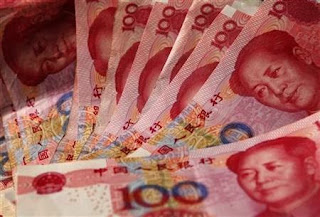Undervaluation has been a problem in the past, says the IMF in a statement, but this is no longer the case. Substantial "appreciation over the past year has brought the exchange rate to a level that is no longer undervalued", it says.
The IMF says China should focus on creating full exchange rate flexibility so that the value of the yuan adjusts as the country grows.
"We urge the authorities to make rapid progress toward greater exchange rate flexibility, a key requirement for a large economy like China's that strives for market-based pricing and is integrating rapidly in global financial markets."
The IMF believes that China should aim to achieve a floating exchange rate within the next two or three years.
"Greater flexibility, with intervention limited to avoiding disorderly market conditions or excessive volatility, will also be key to prevent the exchange rate from moving away from equilibrium in the future."
Beijing has said that it wants the yuan to become an alternative reserve currency to the US dollar.






